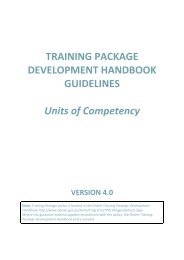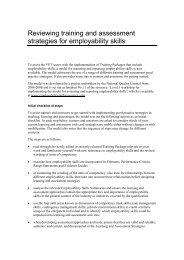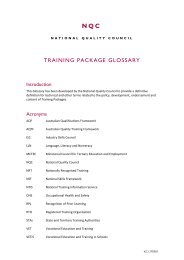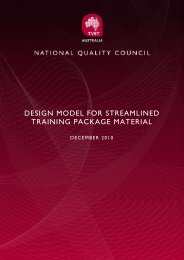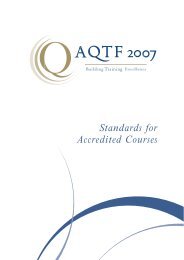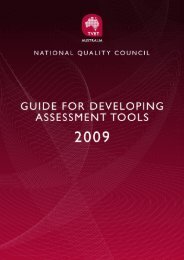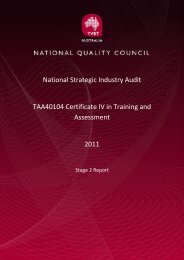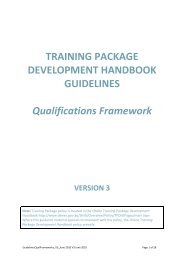NQC Equity Statement.pdf - National Skills Standards Council
NQC Equity Statement.pdf - National Skills Standards Council
NQC Equity Statement.pdf - National Skills Standards Council
Create successful ePaper yourself
Turn your PDF publications into a flip-book with our unique Google optimized e-Paper software.
<strong>National</strong> Quality <strong>Council</strong> <strong>Equity</strong> <strong>Statement</strong><br />
This statement articulates the equity operating principles that underpin all functions of the <strong>National</strong><br />
Quality <strong>Council</strong> and guide all those who work on its behalf.<br />
Context<br />
The <strong>National</strong> Quality <strong>Council</strong> is a Committee of the Ministerial <strong>Council</strong> for Vocational and Technical<br />
Education (MCVTE), and oversees quality assurance and ensures national consistency in the<br />
application of the Australian Quality Training Framework standards for the audit and registration of<br />
training providers.<br />
It has specific decision-making powers in relation to the endorsement of Training Packages and other<br />
aspects of quality assurance under the <strong>National</strong> <strong>Skills</strong> Framework.<br />
<strong>Council</strong> decisions shape vocational education and training systems, products and services and<br />
consequently have considerable impact on learners and potential learners throughout Australia.<br />
Given the close relationship between fairness, equity and quality, the <strong>Council</strong> has adopted the<br />
following set of operating principles to ensure that its policies, products and services contribute to<br />
the creation of an inclusive VET system and do not exclude or unfairly disadvantage potential<br />
learners.<br />
Definitions<br />
The following definitions have been adopted to guide the <strong>Council</strong>’s approach to equity management.<br />
<strong>Equity</strong><br />
The principles and practices of fairness and impartiality in ensuring that all members of a<br />
community have appropriate and equitable access to and potentially equal outcomes from the<br />
opportunities, resources, goods and services provided by an enterprise.<br />
Diversity<br />
The human and social differences within a population, particularly those differences that are<br />
significant in terms of access to goods and services and participation in the workplace and the<br />
community.<br />
<strong>Equity</strong> and diversity management<br />
The continual organisational process of recognising the effects of the relationship between social<br />
and human differences and the provision of goods and services and workplace participation and<br />
incorporating that recognition into policy and practice to minimise the potential disadvantages of<br />
diversity, to optimise its benefits, to ensure social justice and ethical behaviour, and to promote and<br />
maintain inclusiveness and social cohesion (adapted from Bean, cited in Bowman 2004).<br />
Premises<br />
The equity operating principles are founded upon the following underlying premises:<br />
• <strong>Equity</strong> is everybody’s business and this needs to be reflected in the policies, procedures and<br />
practices of organisations.
• The provision of high quality education and training is a prerequisite for the achievement of<br />
a fair and inclusive society.<br />
• Creating accessible and productive learning opportunities and outcomes for clients with<br />
particular needs, may require the co-ordination of policies, programs and services across<br />
other areas of government.<br />
• Membership of an identified equity group does not necessarily mean that an individual<br />
suffers a learning or employment hindrance. Equally, members of equity groups may<br />
encounter barriers other than those associated with their ‘category’ of disadvantage.<br />
Education and training policies and programs, therefore, need to reflect this diversity.<br />
Operating Principles<br />
The following operating principles will guide all aspects of the <strong>National</strong> Quality <strong>Council</strong>’s work.<br />
1. The <strong>NQC</strong> will adopt an integrated approach to the management of equity and diversity so<br />
that all its policies and practices create an organisational culture where differences of<br />
culture, background, and ability are recognised, understood, and catered for in all aspects of<br />
its work.<br />
2. The <strong>NQC</strong> will focus on selected broad client groups as well as enhance the capacity of the<br />
VET system to respond to a diversity of clients.<br />
3. The <strong>NQC</strong> recognises that its policies, products and services have the potential to<br />
differentially affect various social and cultural groups. All policies, practices, products and<br />
services of the <strong>NQC</strong> will be assessed to eliminate or minimise any adverse impacts on<br />
different learners or potential learners<br />
4. The <strong>NQC</strong> recognises the power of vocational education and training policies and practices to<br />
produce and maintain social equity. The <strong>NQC</strong> will support policies and practices, which<br />
support this objective. It will also challenge policies and practices - within its mandate - that<br />
privilege certain groups of students and exclude others.<br />
5. The <strong>NQC</strong> will develop its policies, products and services with regard for the flexibility,<br />
resources and support needed at the point of delivery to encourage and support equitable<br />
participation in nationally recognised training.<br />
6. The <strong>NQC</strong> will actively support and seek the advice of the <strong>National</strong> VET <strong>Equity</strong> Advisory<br />
<strong>Council</strong> and other organisations that enhance the <strong>NQC</strong>’s capacity to contribute to the<br />
creation of an inclusive VET system.<br />
7. The <strong>NQC</strong> will evaluate the impact of its policies and products on equity groups using client<br />
group access, participation and completion data, its own evaluative research and any new<br />
performance indicators developed and reported on by NCVER.





